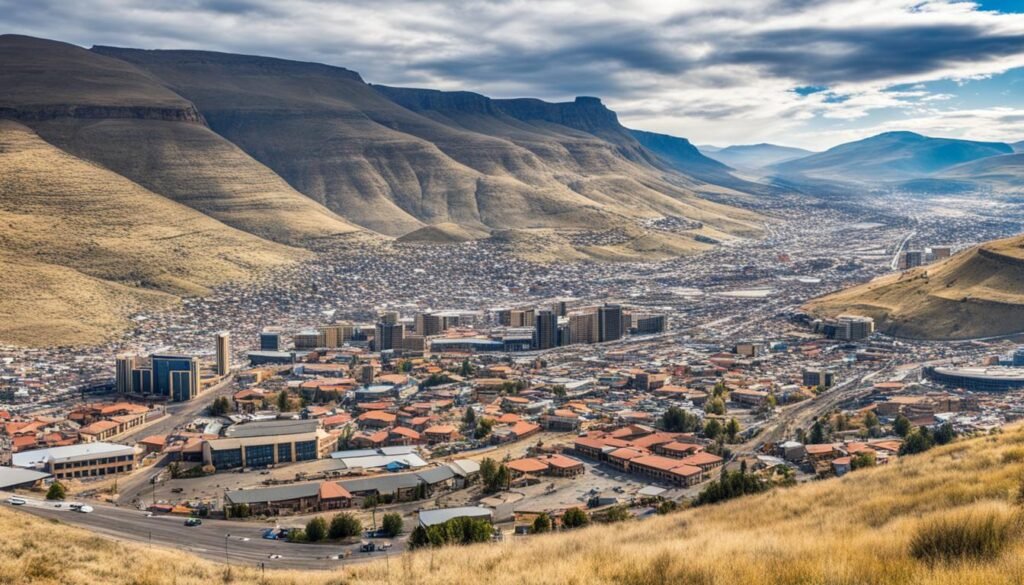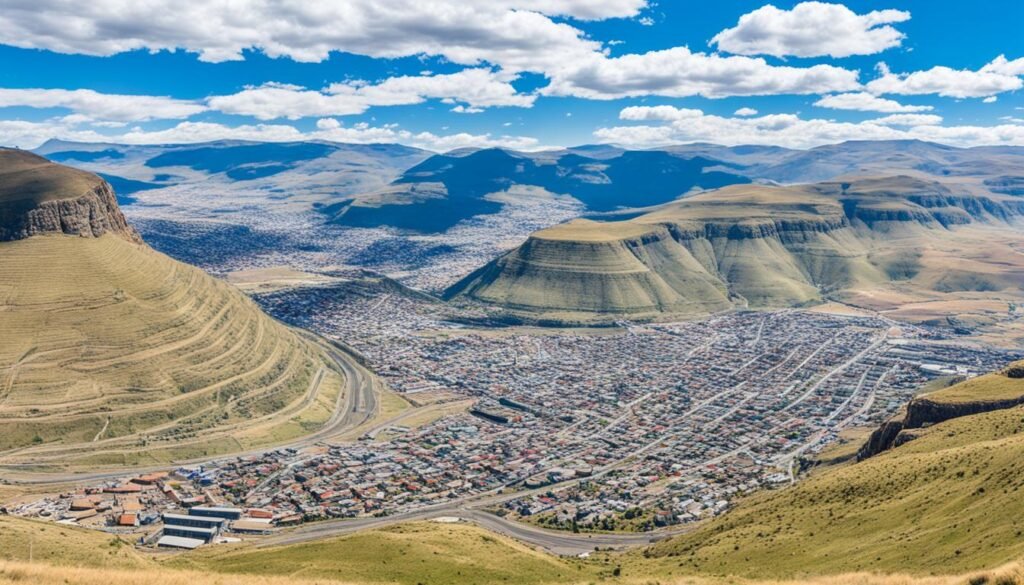Nestled in the heart of Southern Africa, the Kingdom of Lesotho boasts a remarkable statistic – over 80% of its land area is situated above 1,800 meters (5,900 feet) above sea level, making it the only independent country in the world that is entirely mountainous. This unique geographical distinction has shaped the nation’s development, with the capital city of Maseru at the forefront of Lesotho’s transformation into a thriving mountain kingdom.
As Lesotho celebrates over five decades of independence, Maseru has emerged as a hub of economic growth, tourism, and cultural preservation, showcasing the resilience and ingenuity of the Basotho people. From the bustling textile industry to the breathtaking Afriski Mountain Resort, Lesotho’s mountain kingdom is poised to capture the world’s attention and inspire a new generation of visitors and investors.
Key Takeaways
- Lesotho is the only independent country in the world that is entirely mountainous, with over 80% of its land area situated above 1,800 meters (5,900 feet) above sea level.
- Maseru, the capital and largest city of Lesotho, is at the forefront of the country’s development efforts since its independence in 1966.
- Lesotho’s mountain kingdom features a thriving textile industry, a popular tourism destination in Afriski Mountain Resort, and a rich cultural heritage of the Basotho people.
- The article will explore the various facets of Lesotho’s mountain kingdom development, including economic growth, tourism initiatives, environmental conservation, and the cultural richness of the Basotho people.
- The article aims to provide an in-depth understanding of Lesotho’s transformation and its potential to capture the world’s attention as a unique and captivating mountain kingdom.
Introduction to Lesotho’s Mountain Kingdom
Lesotho, a landlocked country in Southern Africa, is often referred to as the “Mountain Kingdom.” This remarkable nation is entirely surrounded by South Africa and boasts a geography defined by its high elevations within the Maloti Mountains. The country’s diverse landscape includes the highest peak in Southern Africa, a testament to its breathtaking natural beauty.
Geographic Overview of Lesotho
Lesotho’s geography is characterized by its rugged terrain, with the majority of the country situated at elevations above 1,800 meters (5,900 feet). The Maloti Mountains, a prominent mountain range, dominate the landscape and are home to numerous peaks, including the highest point in Southern Africa, Thabana Ntlenyana, which rises to an impressive 3,482 meters (11,424 feet).
Historical Background of Lesotho’s Formation
The history of Lesotho can be traced back to the 19th century, when the Basotho people, led by their legendary ruler, King Moshoeshoe I, united to form the Kingdom of Lesotho in 1824. Moshoeshoe I’s vision was to create a safe haven for his people in the mountains, shielding them from the political turmoil and conflicts that plagued the region. This strategic move laid the foundation for the modern-day Lesotho, which later became a British protectorate and gained independence in 1966.
Economic Development in Maseru
Maseru, the capital and largest city of Lesotho, has been the epicenter of the country’s economic development efforts. At the heart of this progress lies the thriving textile industry, which has played a pivotal role in Maseru’s economic landscape.
Role of Textile Industry in Maseru
The textile industry has become a significant employer in Maseru, with factories employing a substantial portion of the local workforce. These factories have not only provided job opportunities but have also contributed to the overall Lesotho economic growth. The sector’s success has been driven by the country’s favorable trade agreements, which have attracted foreign investment and boosted exports.
Infrastructure Projects in Maseru
Alongside the textile industry, Maseru has witnessed the implementation of major infrastructure projects aimed at supporting the city’s economic development. The Katse Dam, a landmark project in Lesotho’s infrastructure, has been instrumental in improving the country’s water management capabilities. This project has not only enhanced Lesotho’s water security but has also paved the way for further economic growth by providing a reliable water supply for various industries.
Despite these advancements, Lesotho continues to face challenges in diversifying its economy and reducing its dependence on South Africa. Nonetheless, the progress made in Maseru serves as a testament to the country’s commitment to economic development and its potential for further growth.
Lesotho: Mountain Kingdom Development Maseru Lesotho
Lesotho’s development as a mountain kingdom has been a complex and multifaceted process, with Maseru at the forefront of these efforts. The country has made strides in improving infrastructure, diversifying its economy, and harnessing its natural resources, all while navigating persistent challenges such as poverty and socioeconomic disparities.
Maseru, the capital and largest city of Lesotho, has been at the heart of the country’s development journey. As the center of government, commerce, and cultural exchange, Maseru has witnessed significant progress in various sectors, including the textile industry and infrastructure projects. These developments have contributed to Lesotho’s economic progress, helping to create new job opportunities and drive the nation’s overall development as a mountain kingdom.

The government of Lesotho, along with its international partners, continues to work towards a more sustainable and equitable development model for the country’s mountain kingdom. This includes addressing persistent challenges, such as poverty and socioeconomic disparities, while leveraging the country’s natural resources and unique geographic positioning to drive economic growth and improve the quality of life for Lesotho’s people.
Tourism Potential in Maseru
Lesotho’s stunning mountain landscape and rich cultural heritage present vast opportunities for tourism development, particularly in the capital city of Maseru. The Afriski Mountain Resort, nestled in the breathtaking Maloti Mountains, has emerged as a premier destination for winter sports enthusiasts and outdoor adventurers alike. From skiing and snowboarding to exhilarating activities like snowmobiling, Afriski offers a unique and thrilling experience that attracts visitors from across the region.
Beyond the allure of the Afriski Mountain Resort, Maseru is also home to the Thaba-Bosiu National Monument, a culturally significant site that showcases the historical legacy of the Basotho kingdom. This iconic landmark, once the capital of the Basotho nation, offers visitors a glimpse into the country’s captivating cultural heritage, from traditional practices to the vibrant arts and crafts of the Basotho people. Exploring the Thaba-Bosiu National Monument and immersing oneself in the Lesotho cultural heritage can be a truly enriching experience for tourists.

The development of Lesotho’s tourism industry, with a focus on destinations like Afriski Mountain Resort and the Thaba-Bosiu National Monument, is a key priority for the country’s economic diversification efforts. By leveraging its natural wonders and cultural richness, Maseru and the broader Lesotho region have the potential to emerge as a captivating tourist destination, attracting visitors from around the world and contributing to the nation’s overall economic growth and prosperity.
Environmental Conservation Efforts
Lesotho’s breathtaking mountain landscape and fragile ecosystems have been at the forefront of the country’s environmental conservation initiatives. The Lesotho Highlands Water Project, a pioneering joint venture with South Africa, has played a crucial role in managing the nation’s precious water resources and generating hydroelectric power.
Lesotho Highlands Water Project
The Lesotho Highlands Water Project is a comprehensive water management system that harnesses the abundant water resources of Lesotho’s highlands. By constructing a series of dams and tunnels, the project ensures a reliable supply of clean water to South Africa, while also providing Lesotho with a significant source of hydroelectric power. This collaborative effort has not only improved access to water but has also contributed to the country’s economic development.
Protection of Mountain Ecosystems
Recognizing the importance of Lesotho’s unique mountain ecosystems, the government and various stakeholders have devoted considerable efforts to their protection. These initiatives aim to safeguard the diverse flora and fauna that call the Lesotho mountains home. Through sustainable land management practices, habitat restoration, and public awareness campaigns, Lesotho is working to ensure the long-term preservation of its natural heritage, bolstering its position as a leader in environmental conservation within the region.

Challenges and Opportunities
Lesotho, as a developing mountain kingdom, faces its fair share of Lesotho development challenges. At the forefront of these issues is the widespread Lesotho poverty, with nearly half of the population living below the poverty line. The country also grapples with high unemployment rates and socioeconomic disparities, compounded by the impact of the HIV/AIDS pandemic.
Poverty and Socioeconomic Issues
Despite its natural beauty and rich cultural heritage, Lesotho’s Lesotho socioeconomic issues remain a significant obstacle to its progress. The country’s reliance on South Africa’s economy, limited diversification, and lack of job opportunities have contributed to the high levels of Lesotho poverty. Addressing these challenges will be crucial for the mountain kingdom to unlock its full potential and create a more prosperous future for its people.
However, Lesotho also presents numerous opportunities for growth and development. The country’s tourism industry, for instance, has the potential to expand, showcasing the country’s stunning landscapes and unique cultural attractions. Leveraging its natural resources, such as water and minerals, more effectively could also contribute to economic diversification and job creation.
International Cooperation and Investment
Lesotho has actively sought to foster Lesotho international cooperation and attract Lesotho foreign investment to support its development efforts. The country has engaged with various global and regional organizations, such as the United Nations, the African Union, and the Southern African Development Community, to secure technical and financial assistance.
Additionally, Lesotho has worked to create a more favorable investment climate to attract private sector partners, particularly in sectors like tourism, infrastructure, and renewable energy. These international partnerships and investment inflows are crucial for Lesotho to overcome its developmental challenges and realize its full potential as a mountain kingdom.

Lesotho’s efforts to strengthen Lesotho international cooperation and Lesotho foreign investment have yielded positive results. The country has secured funding and expertise from global institutions, enabling it to undertake crucial infrastructure projects and social initiatives. These collaborations have also opened up new market opportunities for Lesotho’s products and services, contributing to the nation’s economic growth and development.
As Lesotho continues to navigate the complexities of global partnerships and investment, it remains committed to fostering mutually beneficial relationships that support its vision of becoming a thriving, self-reliant mountain kingdom. Through these international engagements, Lesotho aims to leverage its unique strengths and resources to create a brighter future for its people.
Cultural Richness of the Basotho People
The Basotho people, who make up 99.7% of Lesotho’s population, have a vibrant cultural heritage that is deeply woven into the fabric of the country’s identity as a mountain kingdom. From the use of intricate wool blankets to the construction of unique cave dwellings, the Basotho’s traditional practices showcase their ingenuity and adaptability to the rugged terrain of Lesotho.
Traditional Practices and Crafts
Basotho culture is exemplified through a rich tapestry of artisanal crafts, including pottery, weaving, and metalwork. These creations not only serve practical purposes but also reflect the artistic talents of the Basotho people. The Basotho’s mastery of traditional wool blanket-making, for instance, has produced iconic designs that are celebrated worldwide.
Liqoqo Cave Dwellings
One of the most distinctive features of Basotho culture is the Liqoqo, a network of cave dwellings carved into the mountainsides of Lesotho. These unique structures, some of which date back centuries, were once used as both homes and defensive fortifications by the Basotho people. Today, these cave dwellings serve as a testament to the ingenuity and resilience of the Basotho culture.
Preserving and promoting the cultural richness of the Basotho people is essential for Lesotho’s overall development and the continued empowerment of its people. By honoring their traditions and showcasing their artistic talents, Lesotho can build a stronger and more vibrant identity as a mountain kingdom.
Conclusion
Lesotho’s journey as a mountain kingdom has been marked by remarkable progress and enduring challenges. Maseru, the nation’s capital, has emerged as the epicenter of Lesotho’s development efforts, showcasing economic growth, infrastructure improvements, and a steadfast commitment to environmental conservation and cultural preservation.
From the thriving textile industry to the ambitious Lesotho Highlands Water Project, the country has harnessed its unique natural resources and human capital to drive progress. Yet, Lesotho continues to grapple with persistent poverty, socioeconomic disparities, and the need to diversify its economy beyond its traditional reliance on mining and agriculture.
As Lesotho looks to the future, leveraging international cooperation, attracting strategic investments, and empowering its resilient Basotho people will be crucial for realizing the full potential of the “Mountain Kingdom.” By striking a balance between economic development, environmental sustainability, and cultural heritage, Lesotho can continue to shape a brighter future for its people and solidify its position as a shining example of progress in the heart of Southern Africa.
Source Links
- Lesotho – Mountain Kingdom, Southern Africa, Vibrant Culture – https://www.britannica.com/place/Lesotho/The-Kingdom-of-Lesotho
- Log into Facebook – https://www.facebook.com/LefatseLaBoNtataRona/
- Lesotho – https://en.wikipedia.org/wiki/Lesotho
